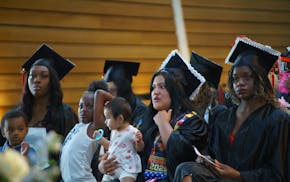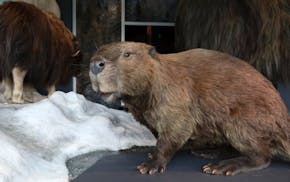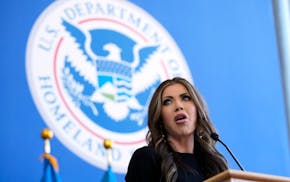Our government is divided and our electorate is divided and the 2018 attack ads and robocalls are still ringing in our ears.
Good people won their races Tuesday night. Good people lost.
The good people of Minnesota just want to know what happens next.
Minnesota's new governor-elect, Tim Walz, struck a hopeful note after his race was called. Maybe, just maybe, he suggested, the next two years won't be the same partisan clown-car wreck the past two have been for America.
Walz took time out from his victory speech to thank his Republican opponent, Jeff Johnson — someone he said "loves this state dearly ... he was simply putting out a different vision."
"We can bridge those gaps to create one Minnesota," Walz told a cheering crowd Tuesday night in St. Paul. "We know there are challenges ahead of us. There have been challenges since the first people who were here, the Anishinaabe and the Dakota and the immigrant farmers and the lumberjacks and the miners and everyone else who came after them. But Minnesota has always risen to the occasion."
Seven peaceful hours passed between his remarks and the first presidential tweets of Wednesday morning. Followed by the first speculative news stories about whether U.S. Sen. Amy Klobuchar will mount a 2020 presidential run against Donald Trump.
"The ballot was more than a ballot," Klobuchar said after cruising to re-election Tuesday night. "It appears to me that Minnesotans voted our dreams and not our fears. We voted for common sense and not blistering words. We voted for getting things done and not gamesmanship and we voted for substance instead of subtweets."
Democrats will control the U.S. House and the Minnesota House while Republicans held on to their Senate majorities. So maybe what's next is gridlock and government shutdowns and endless congressional investigations. Then again, the federal government shut down three times in the past year, so maybe gridlock and shutdowns and endless congressional investigations are the one thing that won't change.
What comes next is going to be interesting.
Republican U.S. Rep. Tom Emmer easily won re-election, but he'll be returning to Washington in the political minority for the first time in his congressional career.
"Guided by our Midwest values, I look forward to building on past successes, seizing new opportunities and taking on new challenges as we continue to build a better future for Minnesota and this nation," he said in a statement Wednesday morning, following it up with a letter calling for expanded trade ties with Cuba — an issue on which he's teamed up with Democrats like Klobuchar to push in the past.
And maybe that's what's next. Lawmakers staking out slivers of policy overlap and bits of bipartisan common ground.
"We have to move from campaigning to governing," said newly elected U.S. Sen. Tina Smith. During a campaign, "people talk at each other, they talk about each other, but they don't necessarily talk to each other. ... That's almost never the right way of getting a problem solved."
Americans turned out to vote in record numbers for a midterm election, and in some races, every single one of those votes tipped the balance.
Election officials counted ballots all night long in the First Congressional District in southern Minnesota before they calculated that Jim Hagedorn had won a seat in Congress on his fourth try. The Hennepin County sheriff's race was decided by a 10th of a percentage point. Wisconsin booted its governor. Ted Cruz still has a job.
Minneapolis is sending a refugee — a Muslim woman in a hijab — to Congress. The Iron Range chose a Republican. The Second Congressional District elected Minnesota's first openly gay member of Congress.
"Growing up, I never saw someone who looked like me in a position of leadership," Lt. Gov.-elect Peggy Flanagan, a member of the White Earth band of Ojibwe, said Tuesday night. "My hope is that tonight's victory shows young Native people across the state ... that anything is possible."
That's the beauty and terror of American elections. On election night, anything is possible.
Former U.S. Sen. David Durenberger, who broke with the GOP to endorse Democrats in the 2018 cycle, watched the election results roll in with a worried eye. This year, he said, it seemed like every vote was a referendum on something more than just the names on the ballot.
"I don't recall an election when I felt that every person's vote counted for something bigger than a preferred candidate. Even when it was me or an opponent," he wrote in an e-mail. "It's not about who wins but about what it means to me and people I care about. Right here, in our country and the world."
Now that the votes have been counted, maybe the politicians won't be the only ones who start talking to one another, instead of at or about each other.
"I heard, so many times on the campaign trail, people saying things to me like, 'I can't even talk to my own dad about politics anymore. I get so mad,' " Smith said. "So I think that what's next is ... to just start talking to each other."
jennifer.brooks@startribune.com • 612-673-4008
Follow Jennifer on Twitter: @stribrooks

Brooks: Hard lives led to hard-won diplomas for these Minnesota high schoolers

Brooks: America mints its last penny. What's the new going rate for our thoughts?

Brooks: From big beavers to little bears, meet Minnesota's newest state symbols

Brooks: Kristi Noem's 'Hunger Games'? It could actually happen.


